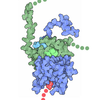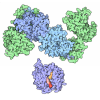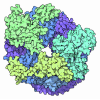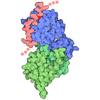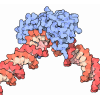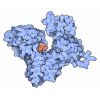[English] 日本語
 Yorodumi
Yorodumi- PDB-8by6: Structure of the human nuclear cap-binding complex bound to NCBP3... -
+ Open data
Open data
- Basic information
Basic information
| Entry | Database: PDB / ID: 8by6 | ||||||
|---|---|---|---|---|---|---|---|
| Title | Structure of the human nuclear cap-binding complex bound to NCBP3(560-620) and cap-analogue m7GpppG | ||||||
 Components Components |
| ||||||
 Keywords Keywords |  RNA BINDING PROTEIN / Nuclear cap-binding complex / NCBP3 / Pol II transcript metabolism RNA BINDING PROTEIN / Nuclear cap-binding complex / NCBP3 / Pol II transcript metabolism | ||||||
| Function / homology |  Function and homology information Function and homology informationsnRNA export from nucleus / nuclear cap binding complex / mRNA metabolic process / RNA cap binding complex / histone mRNA metabolic process / positive regulation of mRNA 3'-end processing / positive regulation of RNA export from nucleus / cap-dependent translational initiation / Processing of Intronless Pre-mRNAs /  snRNA binding ...snRNA export from nucleus / nuclear cap binding complex / mRNA metabolic process / RNA cap binding complex / histone mRNA metabolic process / positive regulation of mRNA 3'-end processing / positive regulation of RNA export from nucleus / cap-dependent translational initiation / Processing of Intronless Pre-mRNAs / snRNA binding ...snRNA export from nucleus / nuclear cap binding complex / mRNA metabolic process / RNA cap binding complex / histone mRNA metabolic process / positive regulation of mRNA 3'-end processing / positive regulation of RNA export from nucleus / cap-dependent translational initiation / Processing of Intronless Pre-mRNAs /  snRNA binding / positive regulation of RNA binding / snRNA binding / positive regulation of RNA binding /  RNA cap binding / alternative mRNA splicing, via spliceosome / SLBP independent Processing of Histone Pre-mRNAs / SLBP Dependent Processing of Replication-Dependent Histone Pre-mRNAs / RNA cap binding / alternative mRNA splicing, via spliceosome / SLBP independent Processing of Histone Pre-mRNAs / SLBP Dependent Processing of Replication-Dependent Histone Pre-mRNAs /  regulation of mRNA processing / primary miRNA processing / regulatory ncRNA-mediated post-transcriptional gene silencing / miRNA-mediated post-transcriptional gene silencing / : / Transport of the SLBP independent Mature mRNA / Transport of the SLBP Dependant Mature mRNA / RNA 7-methylguanosine cap binding / mRNA 3'-end processing / mRNA 3'-end processing / Transport of Mature mRNA Derived from an Intronless Transcript / mRNA cis splicing, via spliceosome / positive regulation of mRNA splicing, via spliceosome / RNA catabolic process / Transport of Mature mRNA derived from an Intron-Containing Transcript / Abortive elongation of HIV-1 transcript in the absence of Tat / FGFR2 alternative splicing / regulation of translational initiation / RNA Polymerase II Transcription Termination / nuclear-transcribed mRNA catabolic process, nonsense-mediated decay / Signaling by FGFR2 IIIa TM / spliceosomal complex assembly / Formation of the Early Elongation Complex / Formation of the HIV-1 Early Elongation Complex / mRNA Capping / mRNA Splicing - Minor Pathway / 7-methylguanosine mRNA capping / Processing of Capped Intron-Containing Pre-mRNA / RNA polymerase II transcribes snRNA genes / Nonsense Mediated Decay (NMD) independent of the Exon Junction Complex (EJC) / Formation of HIV-1 elongation complex containing HIV-1 Tat / Nonsense Mediated Decay (NMD) enhanced by the Exon Junction Complex (EJC) / Formation of HIV elongation complex in the absence of HIV Tat / mRNA export from nucleus / Formation of RNA Pol II elongation complex / RNA Polymerase II Pre-transcription Events / mRNA Splicing - Major Pathway / regulation of mRNA processing / primary miRNA processing / regulatory ncRNA-mediated post-transcriptional gene silencing / miRNA-mediated post-transcriptional gene silencing / : / Transport of the SLBP independent Mature mRNA / Transport of the SLBP Dependant Mature mRNA / RNA 7-methylguanosine cap binding / mRNA 3'-end processing / mRNA 3'-end processing / Transport of Mature mRNA Derived from an Intronless Transcript / mRNA cis splicing, via spliceosome / positive regulation of mRNA splicing, via spliceosome / RNA catabolic process / Transport of Mature mRNA derived from an Intron-Containing Transcript / Abortive elongation of HIV-1 transcript in the absence of Tat / FGFR2 alternative splicing / regulation of translational initiation / RNA Polymerase II Transcription Termination / nuclear-transcribed mRNA catabolic process, nonsense-mediated decay / Signaling by FGFR2 IIIa TM / spliceosomal complex assembly / Formation of the Early Elongation Complex / Formation of the HIV-1 Early Elongation Complex / mRNA Capping / mRNA Splicing - Minor Pathway / 7-methylguanosine mRNA capping / Processing of Capped Intron-Containing Pre-mRNA / RNA polymerase II transcribes snRNA genes / Nonsense Mediated Decay (NMD) independent of the Exon Junction Complex (EJC) / Formation of HIV-1 elongation complex containing HIV-1 Tat / Nonsense Mediated Decay (NMD) enhanced by the Exon Junction Complex (EJC) / Formation of HIV elongation complex in the absence of HIV Tat / mRNA export from nucleus / Formation of RNA Pol II elongation complex / RNA Polymerase II Pre-transcription Events / mRNA Splicing - Major Pathway /  RNA splicing / positive regulation of transcription elongation by RNA polymerase II / mRNA transcription by RNA polymerase II / RNA splicing / positive regulation of transcription elongation by RNA polymerase II / mRNA transcription by RNA polymerase II /  mRNA splicing, via spliceosome / Regulation of expression of SLITs and ROBOs / mRNA splicing, via spliceosome / Regulation of expression of SLITs and ROBOs /  snRNP Assembly / positive regulation of cell growth / defense response to virus / molecular adaptor activity / nuclear speck / snRNP Assembly / positive regulation of cell growth / defense response to virus / molecular adaptor activity / nuclear speck /  ribonucleoprotein complex / ribonucleoprotein complex /  mRNA binding / mRNA binding /  mitochondrion / mitochondrion /  DNA binding / DNA binding /  RNA binding / RNA binding /  nucleoplasm / nucleoplasm /  nucleus / nucleus /  cytosol / cytosol /  cytoplasm cytoplasmSimilarity search - Function | ||||||
| Biological species |   Homo sapiens (human) Homo sapiens (human) | ||||||
| Method |  ELECTRON MICROSCOPY / ELECTRON MICROSCOPY /  single particle reconstruction / single particle reconstruction /  cryo EM / Resolution: 3.19 Å cryo EM / Resolution: 3.19 Å | ||||||
 Authors Authors | Dubiez, E. / Pellegrini, E. / Foucher, A.E. / Cusack, S. / Kadlec, J. | ||||||
| Funding support |  France, 1items France, 1items
| ||||||
 Citation Citation |  Journal: Cell Rep / Year: 2024 Journal: Cell Rep / Year: 2024Title: Structural basis for competitive binding of productive and degradative co-transcriptional effectors to the nuclear cap-binding complex. Authors: Etienne Dubiez / Erika Pellegrini / Maja Finderup Brask / William Garland / Anne-Emmanuelle Foucher / Karine Huard / Torben Heick Jensen / Stephen Cusack / Jan Kadlec /   Abstract: The nuclear cap-binding complex (CBC) coordinates co-transcriptional maturation, transport, or degradation of nascent RNA polymerase II (Pol II) transcripts. CBC with its partner ARS2 forms mutually ...The nuclear cap-binding complex (CBC) coordinates co-transcriptional maturation, transport, or degradation of nascent RNA polymerase II (Pol II) transcripts. CBC with its partner ARS2 forms mutually exclusive complexes with diverse "effectors" that promote either productive or destructive outcomes. Combining AlphaFold predictions with structural and biochemical validation, we show how effectors NCBP3, NELF-E, ARS2, PHAX, and ZC3H18 form competing binary complexes with CBC and how PHAX, NCBP3, ZC3H18, and other effectors compete for binding to ARS2. In ternary CBC-ARS2 complexes with PHAX, NCBP3, or ZC3H18, ARS2 is responsible for the initial effector recruitment but inhibits their direct binding to the CBC. We show that in vivo ZC3H18 binding to both CBC and ARS2 is required for nuclear RNA degradation. We propose that recruitment of PHAX to CBC-ARS2 can lead, with appropriate cues, to competitive displacement of ARS2 and ZC3H18 from the CBC, thus promoting a productive rather than a degradative RNA fate. | ||||||
| History |
|
- Structure visualization
Structure visualization
| Structure viewer | Molecule:  Molmil Molmil Jmol/JSmol Jmol/JSmol |
|---|
- Downloads & links
Downloads & links
- Download
Download
| PDBx/mmCIF format |  8by6.cif.gz 8by6.cif.gz | 200 KB | Display |  PDBx/mmCIF format PDBx/mmCIF format |
|---|---|---|---|---|
| PDB format |  pdb8by6.ent.gz pdb8by6.ent.gz | 154.7 KB | Display |  PDB format PDB format |
| PDBx/mmJSON format |  8by6.json.gz 8by6.json.gz | Tree view |  PDBx/mmJSON format PDBx/mmJSON format | |
| Others |  Other downloads Other downloads |
-Validation report
| Arichive directory |  https://data.pdbj.org/pub/pdb/validation_reports/by/8by6 https://data.pdbj.org/pub/pdb/validation_reports/by/8by6 ftp://data.pdbj.org/pub/pdb/validation_reports/by/8by6 ftp://data.pdbj.org/pub/pdb/validation_reports/by/8by6 | HTTPS FTP |
|---|
-Related structure data
| Related structure data |  16321MC 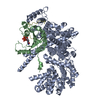 8pmpC 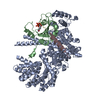 8pntC M: map data used to model this data C: citing same article ( |
|---|---|
| Similar structure data | Similarity search - Function & homology  F&H Search F&H Search |
- Links
Links
- Assembly
Assembly
| Deposited unit | 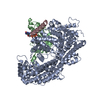
|
|---|---|
| 1 |
|
- Components
Components
| #1: Protein | Mass: 89809.984 Da / Num. of mol.: 1 Source method: isolated from a genetically manipulated source Source: (gene. exp.)   Homo sapiens (human) / Gene: NCBP1, CBP80, NCBP / Production host: Homo sapiens (human) / Gene: NCBP1, CBP80, NCBP / Production host:   Trichoplusia ni (cabbage looper) / References: UniProt: Q09161 Trichoplusia ni (cabbage looper) / References: UniProt: Q09161 |
|---|---|
| #2: Protein | Mass: 18156.260 Da / Num. of mol.: 1 Source method: isolated from a genetically manipulated source Source: (gene. exp.)   Homo sapiens (human) / Gene: NCBP2, CBP20, PIG55 / Production host: Homo sapiens (human) / Gene: NCBP2, CBP20, PIG55 / Production host:   Escherichia coli (E. coli) / References: UniProt: P52298 Escherichia coli (E. coli) / References: UniProt: P52298 |
| #3: Protein | Mass: 6734.328 Da / Num. of mol.: 1 Source method: isolated from a genetically manipulated source Source: (gene. exp.)   Homo sapiens (human) / Gene: NCBP3, C17orf85 / Production host: Homo sapiens (human) / Gene: NCBP3, C17orf85 / Production host:   Escherichia coli (E. coli) / References: UniProt: Q53F19 Escherichia coli (E. coli) / References: UniProt: Q53F19 |
| #4: Chemical | ChemComp-GTG / |
| Has ligand of interest | Y |
-Experimental details
-Experiment
| Experiment | Method:  ELECTRON MICROSCOPY ELECTRON MICROSCOPY |
|---|---|
| EM experiment | Aggregation state: PARTICLE / 3D reconstruction method:  single particle reconstruction single particle reconstruction |
- Sample preparation
Sample preparation
| Component | Name: Ternary complex of CBP80, CBP20 and NCBP3 with bound m7GpppG Type: COMPLEX / Entity ID: #1-#3 / Source: RECOMBINANT |
|---|---|
| Source (natural) | Organism:   Homo sapiens (human) Homo sapiens (human) |
| Source (recombinant) | Organism:   Escherichia coli (E. coli) Escherichia coli (E. coli) |
| Buffer solution | pH: 8 |
| Specimen | Embedding applied: NO / Shadowing applied: NO / Staining applied : NO / Vitrification applied : NO / Vitrification applied : YES : YES |
Vitrification | Cryogen name: ETHANE |
- Electron microscopy imaging
Electron microscopy imaging
| Experimental equipment |  Model: Titan Krios / Image courtesy: FEI Company |
|---|---|
| Microscopy | Model: FEI TITAN KRIOS |
| Electron gun | Electron source : :  FIELD EMISSION GUN / Accelerating voltage: 300 kV / Illumination mode: OTHER FIELD EMISSION GUN / Accelerating voltage: 300 kV / Illumination mode: OTHER |
| Electron lens | Mode: BRIGHT FIELD Bright-field microscopy / Nominal defocus max: 2500 nm / Nominal defocus min: 700 nm Bright-field microscopy / Nominal defocus max: 2500 nm / Nominal defocus min: 700 nm |
| Image recording | Electron dose: 40 e/Å2 / Film or detector model: GATAN K2 QUANTUM (4k x 4k) |
- Processing
Processing
| Software | Name: PHENIX / Version: 1.20.1_4487: / Classification: refinement | ||||||||||||||||||||||||
|---|---|---|---|---|---|---|---|---|---|---|---|---|---|---|---|---|---|---|---|---|---|---|---|---|---|
| EM software |
| ||||||||||||||||||||||||
CTF correction | Type: PHASE FLIPPING AND AMPLITUDE CORRECTION | ||||||||||||||||||||||||
3D reconstruction | Resolution: 3.19 Å / Resolution method: FSC 0.143 CUT-OFF / Num. of particles: 152563 / Symmetry type: POINT | ||||||||||||||||||||||||
| Refine LS restraints |
|
 Movie
Movie Controller
Controller


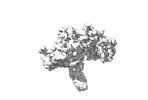

 PDBj
PDBj
